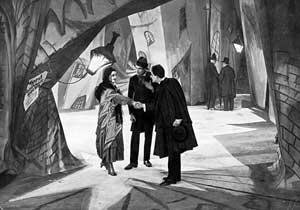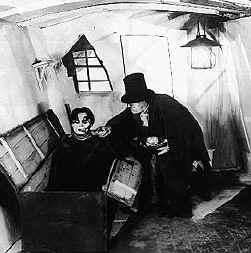 One Hallowe'en night as a college student I attended a live performance of Pierrot Lunaire by Arnold Schoenberg. This great work of chamber music on the subject of madness was such a perfect fit for the season that I've tried to put an ear toward this favorite work every year around this time. It was also a pivotal work of the early twentieth century that solidified the soprano voice, flute, clarinet, violin, cello and piano as the "Pierrot ensemble." It was an early foray into atonal harmony that served notice in 1912 of a particular harmonic path that would be further explored in the years ahead.
One Hallowe'en night as a college student I attended a live performance of Pierrot Lunaire by Arnold Schoenberg. This great work of chamber music on the subject of madness was such a perfect fit for the season that I've tried to put an ear toward this favorite work every year around this time. It was also a pivotal work of the early twentieth century that solidified the soprano voice, flute, clarinet, violin, cello and piano as the "Pierrot ensemble." It was an early foray into atonal harmony that served notice in 1912 of a particular harmonic path that would be further explored in the years ahead.Also featured on this same evening were a set of a capella works for solo soprano
 by Luciano Berio. If I remember correctly they were also focused on the subject of madness. The extended techniques that included cries, screams, sobs and moans certainly left that impression and I found those pieces both fascinating and repulsive.
by Luciano Berio. If I remember correctly they were also focused on the subject of madness. The extended techniques that included cries, screams, sobs and moans certainly left that impression and I found those pieces both fascinating and repulsive.Not wanting to dwell in a rut this Hallowe'en I thought I'd change things up and spend some time with a composition from the other half of the twentieth century that deserves many listenings.
 Das Kabinett des Doktor Caligari (The Cabinet of Dr. Caligari) is a silent film from 1920 directed by Robert Weine. I saw it as part of a film course and was struck by the severe angles of the stylized hand painted set. The aesthetics behind the visual elements of this film are attributed to the same German expressionist movement that influenced and inspired Schoenberg at the time he wrote Pierrot Lunaire. In 1994 Mark Dresser composed a brilliant score for this silent film. The instrumentation is perfect for the feel of this film and perhaps one day the trio of trumpet, prepared piano and contrabass will be known as the "Caligari Ensemble." The recording features Dave Douglas, Denman Maroney and Mark Dresser as the performers as the music drapes across the narrative shape of this early horror film. I have yet to physically experience the film and the modern score as a single experience. Perhaps one Hallowe'en I'll get ambitious and try it that way.
Das Kabinett des Doktor Caligari (The Cabinet of Dr. Caligari) is a silent film from 1920 directed by Robert Weine. I saw it as part of a film course and was struck by the severe angles of the stylized hand painted set. The aesthetics behind the visual elements of this film are attributed to the same German expressionist movement that influenced and inspired Schoenberg at the time he wrote Pierrot Lunaire. In 1994 Mark Dresser composed a brilliant score for this silent film. The instrumentation is perfect for the feel of this film and perhaps one day the trio of trumpet, prepared piano and contrabass will be known as the "Caligari Ensemble." The recording features Dave Douglas, Denman Maroney and Mark Dresser as the performers as the music drapes across the narrative shape of this early horror film. I have yet to physically experience the film and the modern score as a single experience. Perhaps one Hallowe'en I'll get ambitious and try it that way.


No comments:
Post a Comment